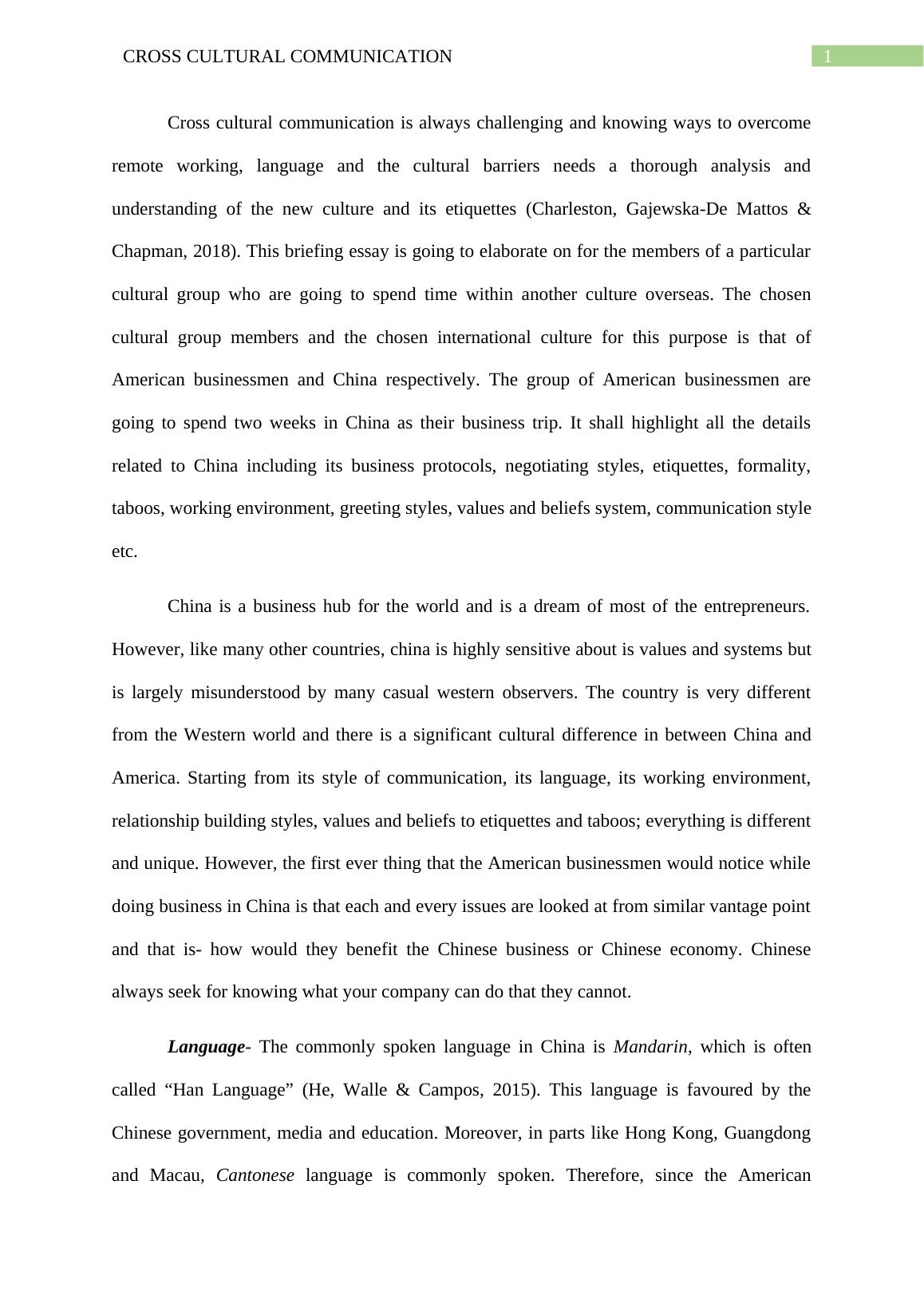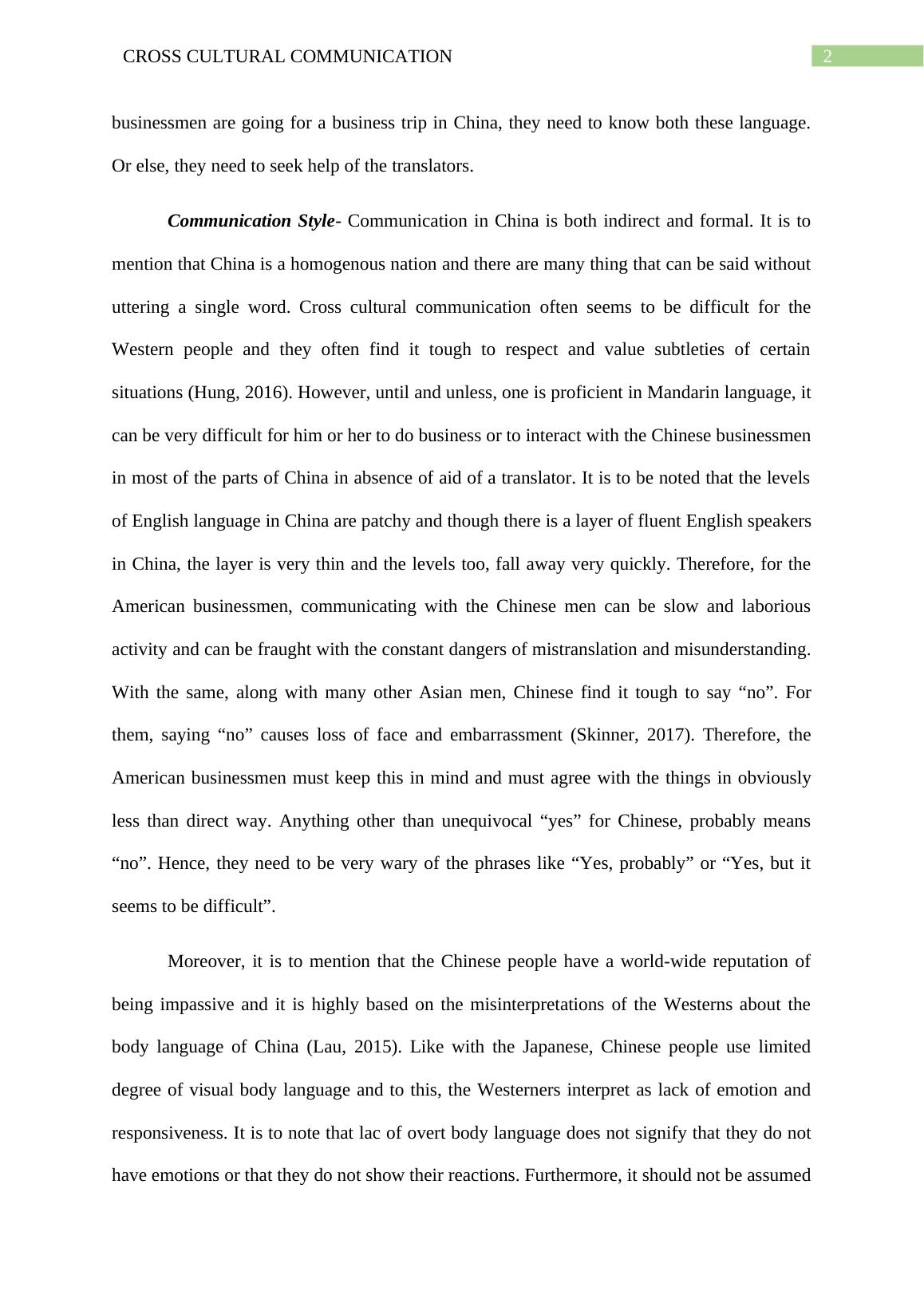Cross Cultural Communication
Added on 2023-04-11
9 Pages2311 Words327 Views
Running head: CROSS CULTURAL COMMUNICATION
Cross Cultural Communication
Name of the Student:
Name of the University:
Author note:
Cross Cultural Communication
Name of the Student:
Name of the University:
Author note:

1CROSS CULTURAL COMMUNICATION
Cross cultural communication is always challenging and knowing ways to overcome
remote working, language and the cultural barriers needs a thorough analysis and
understanding of the new culture and its etiquettes (Charleston, Gajewska-De Mattos &
Chapman, 2018). This briefing essay is going to elaborate on for the members of a particular
cultural group who are going to spend time within another culture overseas. The chosen
cultural group members and the chosen international culture for this purpose is that of
American businessmen and China respectively. The group of American businessmen are
going to spend two weeks in China as their business trip. It shall highlight all the details
related to China including its business protocols, negotiating styles, etiquettes, formality,
taboos, working environment, greeting styles, values and beliefs system, communication style
etc.
China is a business hub for the world and is a dream of most of the entrepreneurs.
However, like many other countries, china is highly sensitive about is values and systems but
is largely misunderstood by many casual western observers. The country is very different
from the Western world and there is a significant cultural difference in between China and
America. Starting from its style of communication, its language, its working environment,
relationship building styles, values and beliefs to etiquettes and taboos; everything is different
and unique. However, the first ever thing that the American businessmen would notice while
doing business in China is that each and every issues are looked at from similar vantage point
and that is- how would they benefit the Chinese business or Chinese economy. Chinese
always seek for knowing what your company can do that they cannot.
Language- The commonly spoken language in China is Mandarin, which is often
called “Han Language” (He, Walle & Campos, 2015). This language is favoured by the
Chinese government, media and education. Moreover, in parts like Hong Kong, Guangdong
and Macau, Cantonese language is commonly spoken. Therefore, since the American
Cross cultural communication is always challenging and knowing ways to overcome
remote working, language and the cultural barriers needs a thorough analysis and
understanding of the new culture and its etiquettes (Charleston, Gajewska-De Mattos &
Chapman, 2018). This briefing essay is going to elaborate on for the members of a particular
cultural group who are going to spend time within another culture overseas. The chosen
cultural group members and the chosen international culture for this purpose is that of
American businessmen and China respectively. The group of American businessmen are
going to spend two weeks in China as their business trip. It shall highlight all the details
related to China including its business protocols, negotiating styles, etiquettes, formality,
taboos, working environment, greeting styles, values and beliefs system, communication style
etc.
China is a business hub for the world and is a dream of most of the entrepreneurs.
However, like many other countries, china is highly sensitive about is values and systems but
is largely misunderstood by many casual western observers. The country is very different
from the Western world and there is a significant cultural difference in between China and
America. Starting from its style of communication, its language, its working environment,
relationship building styles, values and beliefs to etiquettes and taboos; everything is different
and unique. However, the first ever thing that the American businessmen would notice while
doing business in China is that each and every issues are looked at from similar vantage point
and that is- how would they benefit the Chinese business or Chinese economy. Chinese
always seek for knowing what your company can do that they cannot.
Language- The commonly spoken language in China is Mandarin, which is often
called “Han Language” (He, Walle & Campos, 2015). This language is favoured by the
Chinese government, media and education. Moreover, in parts like Hong Kong, Guangdong
and Macau, Cantonese language is commonly spoken. Therefore, since the American

2CROSS CULTURAL COMMUNICATION
businessmen are going for a business trip in China, they need to know both these language.
Or else, they need to seek help of the translators.
Communication Style- Communication in China is both indirect and formal. It is to
mention that China is a homogenous nation and there are many thing that can be said without
uttering a single word. Cross cultural communication often seems to be difficult for the
Western people and they often find it tough to respect and value subtleties of certain
situations (Hung, 2016). However, until and unless, one is proficient in Mandarin language, it
can be very difficult for him or her to do business or to interact with the Chinese businessmen
in most of the parts of China in absence of aid of a translator. It is to be noted that the levels
of English language in China are patchy and though there is a layer of fluent English speakers
in China, the layer is very thin and the levels too, fall away very quickly. Therefore, for the
American businessmen, communicating with the Chinese men can be slow and laborious
activity and can be fraught with the constant dangers of mistranslation and misunderstanding.
With the same, along with many other Asian men, Chinese find it tough to say “no”. For
them, saying “no” causes loss of face and embarrassment (Skinner, 2017). Therefore, the
American businessmen must keep this in mind and must agree with the things in obviously
less than direct way. Anything other than unequivocal “yes” for Chinese, probably means
“no”. Hence, they need to be very wary of the phrases like “Yes, probably” or “Yes, but it
seems to be difficult”.
Moreover, it is to mention that the Chinese people have a world-wide reputation of
being impassive and it is highly based on the misinterpretations of the Westerns about the
body language of China (Lau, 2015). Like with the Japanese, Chinese people use limited
degree of visual body language and to this, the Westerners interpret as lack of emotion and
responsiveness. It is to note that lac of overt body language does not signify that they do not
have emotions or that they do not show their reactions. Furthermore, it should not be assumed
businessmen are going for a business trip in China, they need to know both these language.
Or else, they need to seek help of the translators.
Communication Style- Communication in China is both indirect and formal. It is to
mention that China is a homogenous nation and there are many thing that can be said without
uttering a single word. Cross cultural communication often seems to be difficult for the
Western people and they often find it tough to respect and value subtleties of certain
situations (Hung, 2016). However, until and unless, one is proficient in Mandarin language, it
can be very difficult for him or her to do business or to interact with the Chinese businessmen
in most of the parts of China in absence of aid of a translator. It is to be noted that the levels
of English language in China are patchy and though there is a layer of fluent English speakers
in China, the layer is very thin and the levels too, fall away very quickly. Therefore, for the
American businessmen, communicating with the Chinese men can be slow and laborious
activity and can be fraught with the constant dangers of mistranslation and misunderstanding.
With the same, along with many other Asian men, Chinese find it tough to say “no”. For
them, saying “no” causes loss of face and embarrassment (Skinner, 2017). Therefore, the
American businessmen must keep this in mind and must agree with the things in obviously
less than direct way. Anything other than unequivocal “yes” for Chinese, probably means
“no”. Hence, they need to be very wary of the phrases like “Yes, probably” or “Yes, but it
seems to be difficult”.
Moreover, it is to mention that the Chinese people have a world-wide reputation of
being impassive and it is highly based on the misinterpretations of the Westerns about the
body language of China (Lau, 2015). Like with the Japanese, Chinese people use limited
degree of visual body language and to this, the Westerners interpret as lack of emotion and
responsiveness. It is to note that lac of overt body language does not signify that they do not
have emotions or that they do not show their reactions. Furthermore, it should not be assumed

End of preview
Want to access all the pages? Upload your documents or become a member.
Related Documents
cross cultural management - essaylg...
|15
|3282
|43
Case Study on Culture: McDonald's and Adapting in Chinalg...
|14
|686
|85
Cross Cultural Management: Understanding Cultural Differences and Hofstede's Cultural Dimensionslg...
|13
|928
|62
